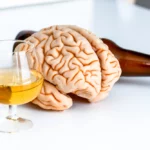Liver diseases, such as cirrhosis, hepatitis, or fatty liver, and personality changes are often the most associated health problems with alcohol addiction. However, wet brain syndrome is a disorder that’s unfamiliar to most people.
Wet brain is a severe brain disorder caused by excessive alcohol consumption and requires immediate medical attention to prevent severe and life-changing consequences. Failure to treat wet brain can lead to permanent brain damage and life-threatening health problems.
What Is Wet Brain Syndrome?

Wet brain, also called alcohol dementia or Wernicke-Korsakoff syndrome (WKS), is a neurological condition caused by a serious vitamin B1 deficiency (thiamine deficiency). This disorder affects the thalamus and hypothalamus leading to psychological and physical symptoms like memory problems, leg tremors, vision difficulties, visual or auditory hallucinations, and delusions. Around 80% of individuals suffering from severe alcohol use disorder experience a lack of thiamine.
In order to properly diagnose wet brain, individuals must be sober when exhibiting symptoms, as the symptoms of wet brain can be mimicked by alcohol withdrawal or medical complications related to alcohol abuse. While the general population is less likely to develop wet brain syndrome (around 1-2%), individuals who frequently consume alcohol have a higher risk, with estimated prevalence rates of 12-14%.

What Are The Stages Of Wet Brain?
Wet brain syndrome is split into two stages. The first stage of wet brain, Wernicke encephalopathy, can be cured by immediate medical intervention and abstaining from alcohol. However, if Wernicke encephalopathy is not treated correctly or alcohol is continuously consumed, the disorder can advance to the next stage, called Korsakoff Syndrome or Korsakoff psychosis.
Stage 1: Wernicke’s Encephalopathy
The first stage of wet brain syndrome is Wernicke’s encephalopathy (WE), a short-term neurological disorder. WE is defined by three significant symptoms, including mental confusion and lack of interest, loss of muscle coordination while standing or walking, eye movement dysfunction, and vision issues.
Individuals in stage one may suffer from paralyzed eye nerves, leading to involuntary eye movements, drooping eyelids, and double vision. Coordination problems may cause WE patients to stagger or lose their ability to walk. Individuals suffering from wet brain do not need to show all three symptoms to be diagnosed with WE. Studies indicate that many WE cases went unnoticed because all three symptoms were not present at the same time, emphasizing the need for a thorough patient evaluation. If Wernicke’s encephalopathy is caught quickly, its effects can be reversed.

Stage 2: Korsakoff Psychosis
Around 80% to 90% of individuals who abuse alcohol and suffer from Wernicke encephalopathy (WE) will likely progress into the next stage of wet brain, Korsakoff’s psychosis. This form of neuropsychiatric dementia develops if the first stage isn’t treated in time or properly diagnosed. This condition may also be known as “alcoholic dementia” or “alcohol amnestic disorder.”
Korsakoff’s psychosis is characterized by neurological symptoms such as memory loss, changes in behavior, and hallucinations. Korsakoff’s psychosis also affects the memory control areas of the brain, leading to memory issues such as retrograde amnesia, which makes it difficult to remember past information, and anterograde amnesia, which hinders the ability to form new memories, are two of the memory problems. This can lead to confabulation or the creation of stories to fill memory gaps. Even though individuals with this condition may display behavioral changes such as apathy, irritability, or a lack of emotion, they may not be aware of their own symptoms.
Unfortunately, when wet brain enters the Korsakoff psychosis stage, it becomes irreversible. It’s still important to stop drinking even though the condition becomes permanent at this stage. If addiction treatment is not received, wet brain will persist and worsen cognitive, psychological, and physical symptoms, sometimes leading to death.

Why Does Thiamine Deficiency Cause Wet Brain?
Thiamine, or vitamin B1, is crucial for generating enzymes that convert sugar into energy, producing neurotransmitters in the brain, and creating genetic matter in cells. But it can only be obtained through dietary sources.
A thiamine deficiency can damage the brain, nerves, and heart. Studies show that alcohol abuse is the leading cause of thiamine deficiency in the United States. There are two main reasons an individual may experience thiamine deficiency during heavy alcohol consumption.
- Malnutrition – Thiamine is only obtainable through a balanced diet, which many alcoholics fail to consume. Even with a healthy diet, the symptoms of heavy drinking, such as vomiting, diarrhea, and increased urination, can hinder the absorption of thiamine.
- Enzymes – The second reason for thiamine deficiency is due to alcohol’s negative impact on liver function. Excessive alcohol consumption can hinder the liver’s ability to efficiently metabolize and use thiamine within the body’s cells, leading to mental and physical impairment.
Signs & Symptoms Of Wet Brain
The easiest way to identify signs of wet brain is by observing if the effects of alcohol and heavy drinking are present even if the person is sober.
The 18 Common Symptoms of Wet Brain Syndrome Include:
- Increased confusion
- Sudden memory loss (this will worsen as the disorder progresses)
- Rapid eye movements
- Fatigue
- Double vision, blurred vision, and drooping eyelids
- Ataxia (difficulty with balance or walking)
- Sudden muscle spasms or tremors
- Loss of consciousness

Common symptoms of Korsakoff psychosis do not usually occur until long after the first stage symptoms have developed. These symptoms include:
- Long-term memory loss
- Short-term memory loss
- Inability to form new memories
- Personality and mood changes
- Vision problems
- Confabulation (fabricating memories)
- Auditory or visual hallucinations
- Coma-like state
- Extreme tremors that make it difficult to walk and perform basic functions
- Death
Can You Treat Wet Brain Syndrome?
The first step in treating wet brain syndrome is to seek immediate medical attention. Treatment may include the administration of thiamine through an IV or as a supplement to boost thiamine levels and improve symptoms. If medical care is received early on, symptoms can be reversed. Symptoms cannot be reversed if the disease progresses into the second stage.
Even though the symptoms of the second stage cannot be reversed, medical professionals will still administer additional thiamine to prevent the disorder from worsening. Treatment may not reduce the symptoms but can prevent wet brain from becoming fatal.
Seeking help from an addiction treatment program is crucial for individuals suffering from wet brain syndrome, as the disorder will progress if alcohol consumption continues. Addiction treatment programs offer a range of tools and resources, including alcohol detox programs and mental health services, to help individuals overcome substance abuse.
How Asheville Recovery Center Can Help
If you or a loved one suffers from wet brain syndrome or needs help treating alcohol addiction, call Asheville Recovery Center. We recognize that addiction is a complex issue and that’s why we created a secure and caring atmosphere for compassionate and non-judgmental recovery. Our team of skilled professionals can identify the signs of wet brain syndrome, form a list of potential treatment options, and create a personalized plan to help with withdrawal symptoms and relapse prevention.






